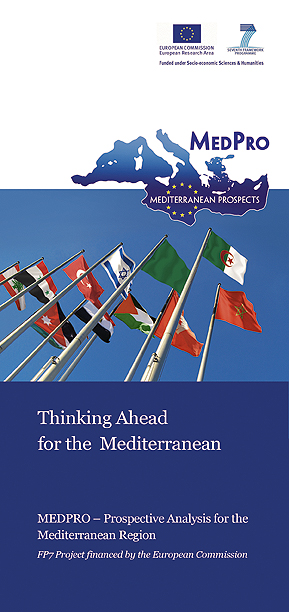- التنسيق العلمي
- الجوغرافية السياسية وحكومة
- الديموغرافيا، والصحة، والشيخوخة
- إدارة البيئة والموارد الطبيعية
- الطاقة، والتخفيف من حدة تغير المناخ
- التكامل الاقتصادي، والتجارة، والاستثمار، والتحليل القطاعي
- الخدمات المالية وسوق رأس المال
- رأس المال البشري، والحماية الاجتماعية، وعدم المساواة والهجرة
- وضع السيناريوهات وتقييم الأثر
- سيناريوهات التكامل الإقليمي والتعاون مع الاتحاد الأوروبي
Economic Impacts of Climate Change in the Southern Mediterranean
ثلاثاء, 12/02/2013 - 12:10 | by admin
This report analyses the potential economic impacts of climate change on 11 southern and eastern Mediterranean countries through the effects of changes on the coastal ecosystem and on agriculture. The impacts are quantified through bottom-up studies assessing the consequences of the deterioration of the coastal ecosystem and protected areas for tourism arrivals, and the effects on yields of major crop families by mid-century. These data are then used as inputs into a world CGE model that quantifies the impact on GDP, sectoral production and prices. The results point to a generalised, albeit moderate loss in the region’s GDP, ranging from -0.1% to -0.25% in 2050. The countries that are more adversely affected are Tunisia (-0.26%/-0.41% of GDP in 2050) and Morocco (-0.04%/-0.14% of GDP in 2050). High losses (-0.13%/-0.36% of GDP in 2050) are also highlighted for the ‘Middle East’ aggregate (including among others Jordan, Syria, Palestine, Lebanon and Israel), which together make up 26.5% of the region’s GDP. Negative impacts are more perceptible at the sectoral level. In the Reference Scenario, the average production loss for the agricultural sector is -0.5% in 2050, with a peak of -1.4% in Tunisia, while that of the service sector is -0.45% in 2050 with a peak of -0.9% in the Middle East. In general, GDP losses linked to tourism activity are greater than those related to agriculture, although this is not the case for Tunisia or Morocco.
Francesco Bosello is Associate Researcher at the Fondazione Eni Enrico Mattei and Assistant Professor of Economics at the University of Milan and Fabio Eboli is Senior Researcher at the Fondazione Eni Enrico Mattei in Milan.
| المرفق | الحجم | الطلبات | Last download |
|---|---|---|---|
| MEDPRO TR No 25 WP4a Bosello.pdf | 660.08 ك.بايت | 1159 | منذ سنة واحدة 34 أسبوعا |
تاريخ المطبوعة:
Thu, 07/02/2013
المؤسسة: FEEM








